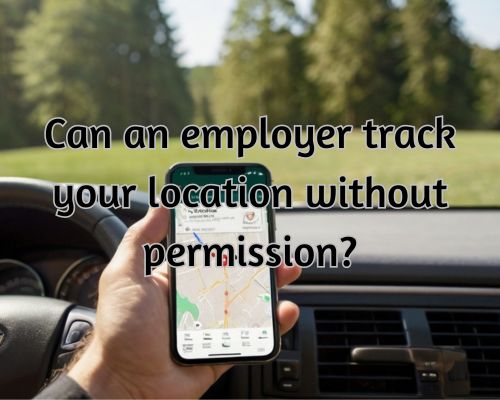In today’s digitally connected workplaces, questions about privacy and surveillance are increasingly relevant.
You might wonder, can your employer track your location without your permission? Let us get to understand this with Sherlock Holmes from Ali Private Investigator Tampa.

Yes, employers can track your location using company-owned devices. However, the legality and limitations vary depending on state laws and specific circumstances.
Companies often use GPS tracking to ensure productivity, maintain security, and provide better services.
For instance, tracking company-owned vehicles is a common practice to monitor deliveries and manage logistics more efficiently. Yet, when it comes to tracking personal devices or vehicles, obtaining consent becomes crucial.
Different states have varying regulations regarding GPS tracking.
For example, Oregon prohibits attaching a GPS tracking device to a vehicle without the owner’s consent, while California has specific privacy laws that protect individuals. By understanding these nuances, you can better grasp your rights and the extent of your employer’s surveillance capabilities.
Legal Landscape of Employee Location Tracking
Employee location tracking involves various legal considerations. These are influenced by privacy laws, federal and state legislation, and significant case laws.
Privacy Laws and Employee Tracking
Privacy laws play a vital role in governing how employers can track the locations of their employees.
Generally, these laws emphasize the necessity for employee consent.
For example, in Connecticut and Delaware, specific consent is required before tracking an employee’s location.
States like California have more stringent privacy protections, including Penal Code Section 637.7, which prohibits tracking any person without their consent. The Fourth Amendment also provides a broader privacy shield against unreasonable searches and seizures, although its application in private employment can vary.
Federal and State Legislation
Federal law in the United States does not have a comprehensive statute specifically addressing GPS tracking of employees. However, some overarching laws influence this practice.
For instance, the Electronic Communications Privacy Act (ECPA) can apply to certain aspects of electronic monitoring.
State laws are more varied.
States like Texas, Illinois, and New York have specific regulations that address different forms of employee monitoring. New York’s Electronic Monitoring Act requires employers to notify employees about any electronic monitoring practices. Similarly, Michigan and Florida have regulations surrounding consent for GPS tracking.
Case Laws Impacting Location Tracking
Several significant case laws have shaped the legal landscape for employee location tracking.
Court decisions can influence how privacy laws and legislation are interpreted and enforced.
For instance, cases involving Vonnie’s Law in Missouri have highlighted the importance of obtaining explicit consent before tracking individuals.
In Virginia and Arkansas, rulings emphasize that employee tracking can only be done within the legal framework to avoid breaching privacy rights. These cases often focus on whether the employees were informed and whether consent was genuinely obtained, underscoring the importance of transparency and adherence to legal standards.
Implementing a Compliant Tracking Policy
To implement a compliant tracking policy, it is crucial to balance efficiency, employee privacy rights, and compliance with legal requirements.
With Sherlock Holmes from Ali Private Investigator Tampa get to know the essential guidelines and practical steps for incorporating GPS tracking devices and clear company policies while respecting employee privacy.
GPS Tracking Devices and Software
Using GPS tracking devices and software is essential for various business needs like fleet tracking, monitoring employee locations, and ensuring operational efficiency.
With advancements in technology, tracking devices can now be easily integrated into smartphones, laptops, and company-owned vehicles.
Geofencing and security cameras can also be used to enhance tracking capabilities.
Be sure to choose tracking software that supports transparency and privacy compliance. Always adhere to legal restrictions, such as prohibiting tracking employee-owned vehicles without consent.
Balancing Efficiency and Privacy Rights
Balancing efficiency and privacy rights requires thoughtful implementation of tracking practices.
Only track locations for legitimate business purposes. For example, you can monitor fleet vehicles or ensure time records are accurate.
Best practices include notifying employees about surveillance measures, regularly reviewing employee data for relevance, and ensuring that tracking measures do not intrude into personal time unless explicitly justified.
Being explicit about when and how monitoring occurs builds trust and keeps your policy compliant.